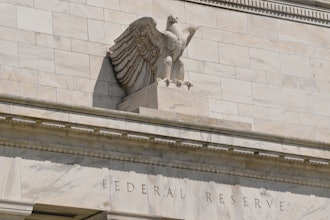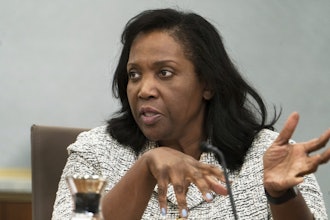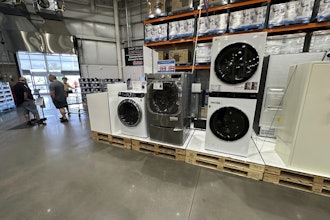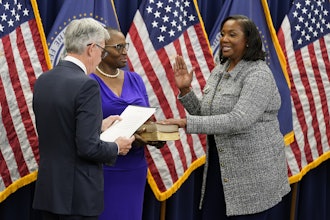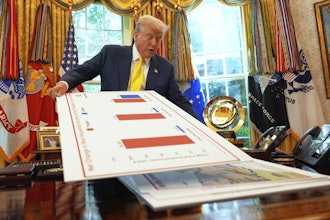The U.S. and China have gone through rough patches before.
The American public recoiled—and the U.S. government imposed sanctions—after the People's Liberation Army slaughtered hundreds of civilians in the streets of Beijing in June 1989, crushing the Tiananmen Square protests.
Ordinary Chinese were outraged 10 years later when the Americans bombed China's embassy in Belgrade, Yugoslavia, rejecting the U.S. insistence that it was an accident.
And tensions crackled when China detained an American Navy flight crew following the midair collision of a U.S. spy plane and a Chinese fighter in 2001.
But U.S.-Chinese relations may be testing a new low.
"The United States and China are on a collision course," the Asia Society concluded in an assessment of the two countries' relations in February. "The foundations of goodwill that took decades to build are rapidly breaking down."
Likewise, Michael Swaine of Carnegie Endowment for International Peace declared in January that "the U.S.-China relationship is confronting its most daunting challenge in the 40 years since the normalization of relations. Current trends portend steadily worsening relations over the long haul."
The world's two biggest economies are engaged in the bitterest trade war since the 1930s. President Donald Trump more than doubled import taxes on $200 billion worth of Chinese goods Friday—the same day that U.S. and Chinese negotiators ended their 11th round of trade talks without reaching an agreement. After the Chinese left town, the U.S. announced plans to target the $300 billion in Chinese goods that don't already face tariffs.
But the widening divide between Washington and Beijing goes beyond trade.
China is engaging in a massive military buildup. It is flexing its maritime muscle, claiming ownership of the South China Sea and disregarding the territorial claims of its neighbors and a 2016 ruling by the International Tribunal on the Law of the Sea. It is cracking down on political dissent in its ostensibly autonomous region of Hong Kong. And it is turning up pressure on Taiwan, an island that enjoys de facto political independence but which Beijing views as a renegade province that must one day reunite with the motherland.
Under President Xi Jinping, who took office in 2012, the Communist Party has grown increasingly repressive. In the Xinjiang Uighur Autonomous Region in western China, it has detained up to 2 million minority Muslims and forced them to undergo reeducation. Xi himself has overturned a four-decade tradition of collective leadership in Beijing and essentially established himself as president for life.
"With the large number of issues we have with China, I wouldn't rank the trade issues so high," said David Dollar, senior fellow at the Brookings Institution and a former official at the World Bank and U.S. Treasury. "And I'm an economist."
The developments are a bracing rebuke to the optimists in America who assumed that China's 2001 entry into the World Trade Organization would lead Beijing to embrace economic and perhaps political openness, that China would become more like world's industrialized democracies.
"Many countries, the U.S. being one of the prime players, gave China pretty much a bye for a number of years during the honeymoon period right after its entrance in the WTO," said Michael Wessel, a member of the U.S.-China Economic and Security Review Commission, a congressionally appointed watchdog.
The financial crisis and ensuing 2007-2009 Great Recession helped change the way the countries viewed themselves and each other. Suddenly, the United States looked less like the world's invincible lone superpower and more like a deeply divided nation that had to struggle to meet the challenge of the deepest economic downturn in seven decades. China's response was sharp contrast: It quickly enacted a massive stimulus campaign that super-charged economic growth and helped pull the entire world economy out of the ditch.
Newly confident, China began to expand its ambitions. After Xi took office, Beijing announced an initiative called Made in China 2025 designed to make Chinese companies world leaders in advanced fields like robotics and artificial intelligence.
But the U.S. says China is trying to meet its aspirations by cheating — stealing trade secrets, forcing foreign companies to hand over technology, subsidizing its own firms and burying in red tape foreign competitors that want to compete in the Chinese market. Those allegations are at the heart of the yearlong trade dispute that has rattled financial markets and cast a cloud over the prospects for world economic growth.
In the ongoing trade talks, the U.S. is insisting that China change its ways and agree to let the United States check and enforce compliance.
Andrew Nathan, a China specialist at Columbia University, said the Chinese would be perfectly willing to buy more American products and put a dent in America's trade deficit with China, a record $379 billion last year.
But abandoning their grander economic vision is another matter.
China's chief envoy to this week's talks, Vice Premier Liu He, told reporters before leaving Washington that "we will make no concessions on matters of principle."
Chinese state TV quoted Liu as saying there was consensus in many areas and the differences were "crucial ones." But he also said he believed the two countries would manage to cooperate for the sake of all.
"For the Chinese, the bottom line is, they can accept no effective limitation on their race to the technological summit," Nathan said. "If you want them to bury the Made in China 2025 program, they will never stop that program, but they can stop talking about it. If you want them to stop the PLA from industrial espionage, they can make the PLA do it more secretly. ... If you want them to stop 'coerced technology transfer,' they can change the language of the relevant rules so that the same thing happens in a less blatant manner."
The two countries have very different views of the sources of their troubles.
"Many American opinion makers are starting to see China as a rising power seeking to unfairly undercut America's economic prosperity, threaten its security, and challenge its values," the Asia Society declared, "while their Chinese counterparts are starting to see the United States as a declining power seeking to prolong its dominance by unfairly containing China's rise."
Main image:The Port of Tacoma in Tacoma, Wash. U.S. and Chinese negotiators resumed trade talks Friday under increasing pressure after President Donald Trump raised tariffs on $200 billion in Chinese goods and Beijing promised to retaliate. (AP Photo/Ted S. Warren)










